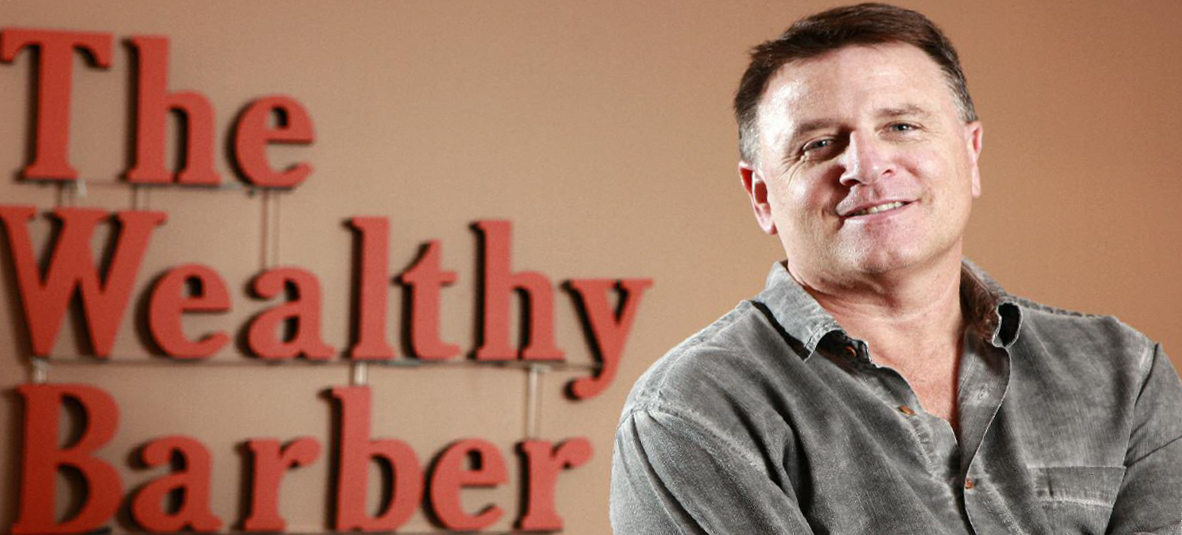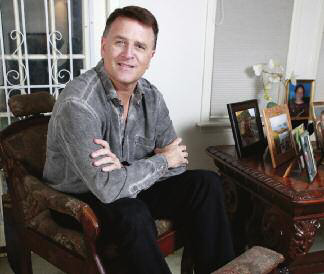By Iris Winston
Photos by John Major
Financial advice that is easy to take
Two million, 25, 24, two, one, 55
Each of these numbers has significance for Canadian financial advisor and author (and unofficial stand-up comedian) David Chilton.
His first book, The Wealthy Barber, sold more than two million copies in Canada and close to another million in the U.S. He was 25 when he began writing it more than 24 years ago. Now, he has just published his second personal finance book, The Wealthy Barber Returns.
“I had one good idea in my life,” he says. “Thank God I had it when I was young.”
The last number on the list was sparked by his reaction to being invited to be the cover story in a magazine called Fifty-Five Plus. “I am not 55,” emphasizes David, who reached the 50-year milestone in October 2011. “I’m not 55 American. I’m not 55 with wind chill. I’m just not 55.”
David is equally emphatic when he says he has a charmed life. “I don’t know a happier or luckier person than I am. I have fantastic parents who have been hugely involved in my life. They’re in their late 70s now, in incredible health. And they’re not just healthy. They are essentially the same people today they have been my entire life. They have the same energy level, the same activity level and the same involvement in my life and my kids’ lives.”
Rumour has it that the involvement includes David’s mother continuing to do her son’s laundry. Other examples of familial closeness are that his adult son, Scott, still lives with him and that David listened to his mother’s advice to help Greta and Janet Podleski of Looneyspoons fame publish their cookbooks.
“When Janet saw that The Wealthy Barber was self-published and his telephone number was in the book, she called him — I remember thinking she was crazy,” says her sister, Greta. “He said he was impressed by our idea and enthusiasm. He even gave us $2,000 because he was sorry for us, but said he was busy with his own business.”
“I also pointed out that if I published their cookbook, it wouldn’t be self-published,” points out David.
“But we gave him some sample recipes and he gave them to his mom to try out,” says Greta, explaining how the three came together to form Granet Publishing. “And she said that it was the best food she had ever eaten and he had to help us. If you’re David, when your mom says, publish a book, you do it.”
Although David left the presidency of Granet to work on The Wealthy Barber Returns, the three remain friends and the Podleskis continue to share office space with David. “We see him all the time,” says Greta. “When we need advice, he is still the first person we turn to.”
His philosophy of staying close to friends is demonstrated by the fact that a number of his friendships reach back to his childhood. As he puts it, added to his luck of being born into the right family is his luck of falling in with the right group of friends growing up in Kitchener/Waterloo — they are friends still — and to being very healthy. (“I don’t even get colds,” he says.)
“A whole group of us met in Grade 7 and grew up together in the same neighbourhood and spent as much time in each other’s houses as our own,” says Alex Mustakas (now artistic director and chief executive officer of Drayton Entertainment). “That affects your life going forward. Dave was the best man at my wedding and we have remained lifelong friends. When we got really busy building our careers, we didn’t see each other as often, but when we did, it was as though we had seen each other yesterday.”
When the two were in their second year at Wilfrid Laurier University in Waterloo, David, then 18, and Alex started a GIC (guaranteed investment certificate) business as part of a co-operative education program.
“People looking for the highest interest rate in the marketplace would come to us and we would shop all the Canadian trust companies and banks,” says David. “We would tell them to make their cheques out to whichever company was offering the highest rate and that company would pay us a small commission.”
“We happened to launch the business when interest rates were peaking in Canada in 1980 and 1981, so everyone was buying GICs,” he adds. “And because we were so young, we got a lot of media attention.”
The huge success of the student-run business meant that one of the partners needed to be in charge full-time. “Alex couldn’t do it on a full-time basis because he was also a singer and actor and had commitments in New York and London,” David says.
“Dave really got the (investment) bug and wanted to continue,” says Alex, who stayed on at Laurier to complete his degree. “He was as brilliant in high school and university as he is today.”
“I had more flexibility. Running that business was a great way to get my feet wet, not only in investments, but also in learning how to run a business and deal with people,” says David.
“Part of his success is his charm and his sense of humour,” adds Alex. “He’s every man’s person. He doesn’t talk down to anyone and he is very generous. He has helped our theatre many times and has done loads of work for the Children’s Wish Foundation.”
Acing the Canadian Securities Course in 1985 added further momentum to David’s career. “I didn’t study for it,” he says. “I had read so many books on personal finances and investment that it was more or less second nature to me. I signed up for the course and wrote the exam a week later.”
Winning the H.L. Gassard Memorial Award for the highest score in the country on the CSC gave him additional credibility in his burgeoning career as a stockbroker. A decade later, at the invitation of his alma mater, he did complete an Economics degree — studying while he was on the road promoting The Wealthy Barber.
“I lucked into The Wealthy Barber,” says David. “There really was a lot of luck there. People think I’m being falsely modest, but I’m not. I was trying to take conventional wisdom and make it more accessible. When it came out, there was almost no competition in the marketplace. There were only two other Canadian personal finance books. At the same time, interest rates were going down, so people started to look at investments other than GICs. Demographics were onside too. The baby boomers were starting through their saving years and need to learn and the financial institutions were entering the wealth management business more aggressively and were looking for education tools. So all kinds of things came together. The timing was really lucky.”
He is also quick to say that his ex-wife, Susan, was “a big part of the success of the book. Without her, there would be no Wealthy Barber. Earlier, I had left the brokerage business to take less income teaching teachers financial planning. Then I put that aside temporarily to write a book and decided to self-publish it, which meant that most of the money we had saved went for the printing. For someone to cooperate and be supportive through all of that was huge. But she always had full faith that the book would work out.”
Heavy promotion helped in that regard, he says. After publishing the finished work, edited by his sister and written in his home office (basement), David used his public-speaking ability to good effect. For a decade after The Wealthy Barber hit the bookstores, he “did an incredible amount of public speaking” in Canada and the U.S., where the book was the basis for PBS television specials.
“I’m not very skilled,” he says. “Ask anybody who has seen me golf. But I’m a good speaker. So I was able to harness the one skill I had to help me with the book exposure.”
The book’s growing popularity attracted the interest of commercial publishers and David eventually sold the rights to the Stoddart Publishing Company, which went under in 2003.
“When Stoddart went bankrupt, I got the rights back in my hands,” says David. “I took The Wealthy Barber off the shelves and retired it around its 20th anniversary. I liked the idea of retiring it while it was still doing well.”
Instead of republishing an updated version, he decided to write a new book in a different style. Only the title, The Wealthy Barber Returns, and the fact that it too, is self-published, recalls the original.
“I have tried to come at the saving/spending challenge from 10 to 15 different angles in The Wealthy Barber Returns,” he says. “One of the big pushes I have in the book is instead of dwelling on how bad we are as savers, it might be more productive to think of how fantastic we are as spenders. Then I start breaking it down to see why we are so good. Why do we want to spend so much? I look at it from every angle — our DNA, our prehistoric roots, the psychological and philosophical aspects, even from the angle of how our brains light up when we spend certain amounts of money. And I always try to wrap it in humour and short stories. I think that’s why the book is going over well.”
The good news about the saving/spending situation, he adds, is “you don’t have to change your spending habits by very much to increase your savings rate dramatically. Cutting back your spending by five, six or seven per cent can raise your savings rate by 100 or 200 per cent.”
“I’m not trying to tell people they can’t have fun,” emphasizes David, an avid sports fan, who frequently attends games far from home, often with his son and daughter. “Even really good savers have areas where they spend a lot, and get a lot of joy from it. But the key is that they cut back elsewhere.”
The main focus of The Wealthy Barber Returns is to offer techniques on how to maintain the saving/spending balance, including maintaining the joy in life.
“You can’t be as specific with the older group of people because every situation is different,” says David. “It’s a lot easier to use the wealthy barber approach when you are dealing with people of 25, 35 and 45. Then you can say things like save 10 per cent, pay off your mortgage and max out your RRSPs. But with people of 55 and 60, some are married, some aren’t. Some have pensions, some don’t. Some have health issues or want to live abroad. Some don’t. It would be much more difficult if I ever wrote a book called The Wealthy Barber Retires and tried to look at all the different scenarios. Giving blanket advice for older groups is impossible.”
“That’s why I think most of them can benefit from having a good financial adviser,” he adds. “The challenge is how to distinguish between a good and not-so-good financial adviser. No company or individual has a monopoly on honesty, ethics and competence.”
But he can offer some pointers on how to choose an adviser. First, he says, “all good advisers are exceptionally well read. They are passionate about their job and if they are constantly reading about all things money, it’s a good indicator they are in the job for the right reason. They also have good communication skills — the most underrated asset in the adviser/client relationship. You need people who can dialogue back and forth and have good listening skills. You don’t want someone with a cookie-cutter plan and says this is right for everybody. Any plan has to be customized to the individual’s risk-tolerance levels and their time frames and the financial adviser should be adding value to developing a well-rounded plan taking in taxes, insurance, making sure you have a will and so on —not to be trying to outguess the stock market. If that’s where the value is supposed to be coming from, run, don’t walk, away from that adviser.”
David, who lives in a 1,300-square-foot bungalow, also points out that “a lot of people think they’re wealthier than they actually are because they have a fully paid-for $600,000 home. But you can’t spend your kitchen. And if you don’t have any savings or a defined benefit pension plan, you’ll be looking at that home later in life and be thinking it’s such a great asset. Well, is it? Are you going to sell it and move way down? Most people don’t do that, so they’re having trouble harnessing that equity and turning it into a productive retirement asset that spins off an income. A lot of people have this illusion of wealth.”
David also has strong feelings about the plastic answer to dealing with debt. “It is a myth that people who pay off their credit cards each month are not adversely affected by them. All the studies show that when you use a credit card, you are much more likely to spend excessively than when you pay cash. Credit cards anesthetize the pain of parting with the money. A lot of people do pay off their credit cards each month, but they use them so much more to spend that they pinch their savings and don’t save at the appropriate level. It’s similar with debit cards. Another of the myths is that debit cards are better than credit cards. They are insofar as you are spending your own money and not building up a big balance at a high interest rate, but the downside is that the debit card makes it easier to spend in an easy-spend environment, where everyone is marketing at us all the time and there are ATM machines everywhere. Everything is just a mindless swipe away. I use cash more than anyone I know because it acts as a system of checks and balances. You know what you are spending as you spend it. It stops money slipping through the cracks.”
He recommends maintaining a spending summary for a couple of months. “All the research shows that when people monitor their spending, even without making an effort to adjust, they actually spend less money. Just the act of keeping track creates awareness and changes behaviour. They save more efficiently and spend more effectively. When spending, they tend to migrate to the areas that give them true joy and spend less money on things that didn’t really give them any bang for their buck.”
 Potpourri
Potpourri
The Wealthy Barber is the top bestseller in Canadian history (with the exception of the Bible and the Harry Potter books by J.K. Rowling).
- David Chilton originally conceived The Wealthy Barber as The Wealthy Bartender, but financial matters mixed with alcohol became a little too complicated.
- Roy, the fictional barber who gave financial advice to his clients, presented a more comfortable and comforting lifestyle.
- The original sales goal for The Wealthy Barber was 10,000 copies (still bestseller status in Canada), a milestone it passed during its second year in the marketplace “when word of mouth kicked in.”
- The Wealthy Barber Returns, written close to a quarter of a century later — when David Chilton was “significantly older and marginally wiser” — hit the bestseller list less than two months after it was published.
- David Chilton, as president of Granet Publishing, published Looneyspoons, Crazy Plates, and Eat, Shrink & Be Merry cookbooks by Greta and Janet Podleski — all bestsellers.
- David Chilton home schooled his children—his son, Scott, for three years and his daughter, Courtney, for a few months. “I’m surprised she lasted that long based on her first-day response,” says David. “She thought of home schooling more as home “leisuring” and really missed the social aspects of regular school.”
- David Chilton has not said that he will write The Wealthy Barber Retires, but…







